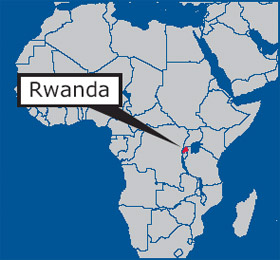By Adebowale Bello. B.Tech Microbiology. Freelance Health Writer.

Map of Africa showing Rwanda
November 22, 2024: On November 9, 2024, Rwanda began a 42-day countdown to officially declare the Marburg virus disease (MVD) outbreak over. This follows the successful testing of the last confirmed patient, who was declared negative for the virus on November 8. With no new cases reported since October 30, Rwanda is cautiously optimistic but strict surveillance and preventive measures remain in place.
Related: Rwanda’s Marburg Outbreak: No New Cases Amidst Ongoing Vigilance
The outbreak in Rwanda, reported earlier this year, has been the third-largest MVD outbreak globally, with 66 confirmed cases, 15 deaths and a case fatality rate (CFR) of 23%. Remarkably, 51 individuals have recovered, marking significant progress in patient care. Most cases were concentrated in Kigali with 80% of infections occurring among health workers, emphasizing the occupational risks in handling viral diseases.
Related: Rwanda Declares Marburg Virus Outbreak with 13 Deaths
Rwanda’s proactive measures, including contact tracing, laboratory testing and community sensitization, have been pivotal. By November 8, over 7,400 tests had been conducted, with daily testing rates ranging from 100 to 350 samples. There are currently 470 contacts under follow-up, ensuring any potential flare-ups are detected and managed promptly.
The World Health Organization (WHO) mandates a 42-day observation period—twice the maximum incubation period of the virus—before declaring an outbreak over. This ensures that no undetected infections remain. In Rwanda’s case, the countdown started the day after the last patient tested negative, marking November 9 as the beginning of this critical phase.
How Has Rwanda Responded To The Outbreak?
Rwanda’s Ministry of Health, supported by WHO and partners has implemented a comprehensive response strategy. Some key actions include:
1. Surveillance and Testing: Active case finding, contact tracing and testing of suspected cases remain ongoing.
2. Healthcare Support: Enhanced infection prevention and control (IPC) measures in health facilities have been prioritized to protect frontline workers and patients.
3, Community Engagement: Raising awareness about MVD transmission, symptoms and preventive measures is critical. Community members are encouraged to report symptoms early and avoid unsafe burial practices.
4. Cross-Border Measures: Collaboration with neighbouring countries to strengthen border health capacities ensures early detection of any potential cross-border transmission.
Rwanda’s experience highlights the risks health workers face during outbreaks as nearly 80% of cases were healthcare-associated infections. It also highlights the importance of robust IPC protocols, timely testing and community engagement in managing such crises.
If the country remains free of new cases until December 20, the outbreak will be officially declared over. This milestone would not only mark a victory for Rwanda but also serve as a testament to the power of collective action in managing infectious diseases.
As Rwanda counts down the days, its efforts remind us of the importance of vigilance and global solidarity in the face of health crises.
Marburg Virus Disease is a highly virulent hemorrhagic fever caused by a virus from the same family as Ebola. It spreads through contact with bodily fluids of infected individuals, contaminated surfaces and materials like clothing and bedding. Symptoms include high fever, severe headache, abdominal pain and in some cases, bleeding. There is no approved treatment or vaccine for MVD, making outbreaks particularly challenging to manage.
Source: World Health Organization Newsroom
Related: Rwanda Receives Marburg Virus Vaccines amid Outbreak
Published: November 22, 2024
© 2024. Datelinehealth Africa Inc. All rights reserved.
Permission is given to copy, use and share content for non-commercial purposes without alteration or modification and subject to attribution as to source.
DATELINEHEALTH AFRICA INC., is a digital publisher for informational and educational purposes and does not offer personal medical care and advice. If you have a medical problem needing routine or emergency attention, call your doctor or local emergency services immediately, or visit the nearest emergency room or the nearest hospital. You should consult your professional healthcare provider before starting any nutrition, diet, exercise, fitness, medical or wellness program mentioned or referenced in the DatelinehealthAfrica website. Click here for more disclaimer notice.